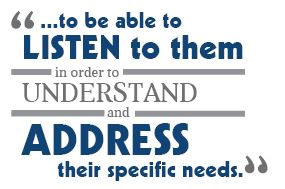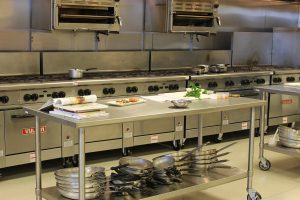What is Foodservice Consulting and Design?
According to the School Nutrition Association, the National School Lunch Program serves an average of 29.8 million lunches each day or 4.9 billion annually. That is just within the NSLP, which serves K-12 schools. Following the same math, if the 327 million individuals living in the U.S. today would eat a lunch prepared for them every day, commercial foodservice spaces would need to produce about 119.4 billion lunches a year. But how can we create efficient spaces capable of handling such a demand? One solution is to hire a foodservice consultant.
What is a Foodservice Consultant?
A foodservice consultant can expertly guide an owner to an array of equipment from a variety of manufacturers, allowing for only the most applicable and efficient equipment to add to the space. Foodservice consultants are also trained to define and address deficiencies and potential issues, saving the owner money and hassle.
 There are two main types of Foodservice consultants: Management Advisory Services (MAS) Consultant and Foodservice Design Consultant. Within these two areas, every consultant has a niche that he or she specializes in. Owners who have an idea of what they want their foodservice space to achieve, should look for a consultant that specializes in that area. Owners who want a complete renovation or are new to foodservices, might want to start with a Management Advisory Services (MAS) Consultant. MAS Consultants can help clients establish concept, menu development, and staffing.
There are two main types of Foodservice consultants: Management Advisory Services (MAS) Consultant and Foodservice Design Consultant. Within these two areas, every consultant has a niche that he or she specializes in. Owners who have an idea of what they want their foodservice space to achieve, should look for a consultant that specializes in that area. Owners who want a complete renovation or are new to foodservices, might want to start with a Management Advisory Services (MAS) Consultant. MAS Consultants can help clients establish concept, menu development, and staffing.
A Foodservice Design Consultant starts with space programming. The design consultant listens to owners’ needs and then translates that into a space of the proper size to accommodate the best, most applicable equipment – designing the space for the equipment rather than trying to put equipment into a space incapable of handling it. A design consultant can also explain to clients what spaces they need, such as preparation areas and offices, in order for the space to serve its intended purpose most effectively.
Regardless of niche, the essence of any foodservice consultant, says Jordon Kramp, a Foodservice Designer at Alvine, is to “help the client – to be able to listen to them in order to understand and address their specific needs.”
Why Would I Want to Hire a Foodservice Consultant?
According to Kramp, there are many reasons, all of which contribute to the overall increase in value within the space. First and foremost, a foodservice consultant is independent, making their main focus providing clients with the best possible space. Consultants do not earn a commission or any other compensation for specifying a particular manufacturer or piece of equipment.
 The objectivity of foodservice consultants is one of their greatest assets. This applies not only to manufacturers, but to the consultant’s own personal opinions. From the outside, a consultant might not understand why the client has a specific piece of equipment, but Kramp says, “Never give a client something less than they already have.” In the end, clients should feel comfortable in their own space. That piece of equipment might seem unnecessary at first glance, but could be essential in preparing an iconic meal.
The objectivity of foodservice consultants is one of their greatest assets. This applies not only to manufacturers, but to the consultant’s own personal opinions. From the outside, a consultant might not understand why the client has a specific piece of equipment, but Kramp says, “Never give a client something less than they already have.” In the end, clients should feel comfortable in their own space. That piece of equipment might seem unnecessary at first glance, but could be essential in preparing an iconic meal.
While some representatives of manufacturers will offer design services, they will also push the client to utilize as much of the manufacturer’s equipment as possible, regardless of whether or not it is best for the space or the client’s needs. A foodservice consultant’s vast knowledge of manufacturing equipment is not bound by loyalty, but is backed by research. Nor is it limited to manufacturer and model, but includes numerous options and accessories for specific applications.
 In addition, independent consultants have the advantage of working with a great variety of clients and projects around the world. The experience gained from these interactions adds to the consultant’s overall knowledge base, leading to new approaches, refined strategies, and potential trends that can be used in assisting and educating new clients.
In addition, independent consultants have the advantage of working with a great variety of clients and projects around the world. The experience gained from these interactions adds to the consultant’s overall knowledge base, leading to new approaches, refined strategies, and potential trends that can be used in assisting and educating new clients.
It is also the job of foodservice consultants to act as a bridge between the food service staff and the architectural team. They help to communicate the needs of those who will be living in the space with those responsible for seeing it all come together. This is especially helpful when deciding on room finish materials within the space, as they impact durability and ease of cleaning.
Sometimes clients come to the table knowing exactly what they want; however, a consultant knows to carefully consider the client’s plans. The client may not be able to recognize hidden issues that have caused problems in the existing space. A consultant can work to identify and address these issues so that they are not carried over into the new space.
Where can I See the Benefits?
A well-designed foodservice space will have a look built around organization and cleanliness. Proper flow patterns within the spaces not only make movement easier, but safeguard against contamination. The placement of equipment is also key as it can help or hinder staff efficiency – impacting service time and the number of necessary staff members. Aisle spacing is another difficult area because of its role in efficiency, and especially, safety.
 Kramp also explained that safety is central in the thought process behind the placement of rough-ins, a consideration not always recognized by those who do not specialize in the industry. Placing rough-ins in efficient places helps to keep piping and electrical wires out of the working space as much as possible. Electrical safety is always important, but piping and wires within food preparation areas present an additional, unique concern. They can be difficult, if not impossible, to clean, which raises concerns for contamination and food-borne illness.
Kramp also explained that safety is central in the thought process behind the placement of rough-ins, a consideration not always recognized by those who do not specialize in the industry. Placing rough-ins in efficient places helps to keep piping and electrical wires out of the working space as much as possible. Electrical safety is always important, but piping and wires within food preparation areas present an additional, unique concern. They can be difficult, if not impossible, to clean, which raises concerns for contamination and food-borne illness.
An investment, some of the benefits cannot be seen right away, but become evident a few years down the road. For instance, a specialized freezer originally on a client’s wish list may become a financial reality after two years of successful business. Foodservice consultants will design a facility with potential future provisions in mind, giving clients the ability to grow their space with their needs and give consumers new options as trends evolve.
Where Can I Learn More?
The authority on all things foodservice consulting is a network of professionals called the Foodservice Consultants Society International (FCSI). Visit the FCSI website to learn more about the foodservice industry, foodservice consultants, and consultants in your area.
To learn more about the services Jordon Kramp provides at Alvine visit the services page. To review a sample of Kramp’s experience, see his FCSI member page.



